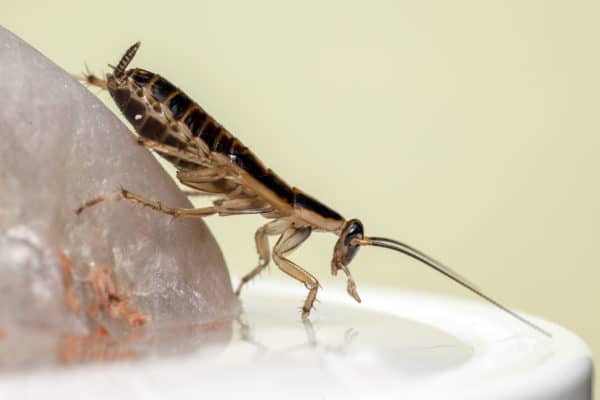READY TO GET STARTED?
REQUEST A FREE ESTIMATE
Fill out the form below or call (888) 466-7849 for a free, no-obligation estimate.

Cockroaches thrive in environments where they have adequate sources of three things: food, shelter, and water. Oftentimes our homes provide ample amounts of each of these which is what attracts cockroaches. The National Pest Management Association (NPMA) reports that 63% of all homes in the US have cockroaches even if the homeowner doesn’t realize they are there.
There are more than 4000 species of cockroaches worldwide. They are nocturnal pests and extremely versatile, adapting to almost any environment, making their populations extremely difficult to control. Roaches can survive up to a week without their heads and up to 30 days without food.
While roaches are nuisance pests in your home and quite unsightly when you stumble across one unexpectedly, are they dangerous to humans? Can they make you sick? Let’s answer these questions and more:
While bites from roaches are extremely rare, they are, in fact, possible. Roaches are typically not aggressive pests and tend to flee rather than fight when faced with a predator. There have been rare instances, however, where roach bites did occur, most often when humans were sleeping or pets were too weak or debilitated to brush them off. Roaches don’t produce any form of poison and cannot sting.
Roaches come from areas that harbor bacteria, such as bathrooms, drains, and dumpsters. They feed on garbage, breed in sewage, and excrete waste over every surface they touch. Roaches are excellent hiders and particularly favor moist and confined areas. Roaches are thigmotropic which means they want to feel contact on all sides of their bodies. Because of this, roaches are commonly found nesting under sinks, in wall cracks, in drains, around water heaters, behind appliances, in cupboards and pantries, under stacks of paper and cardboard, and under undisturbed furniture.
Roaches carry pathogens and microorganisms that can cause disease in humans. In fact, up to 30 different species of bacteria have been discovered on cockroaches. The World Health Organization (WHO) reports that roaches can carry pathogens that cause a variety of diseases including gastroenteritis (with diarrhea, nausea, and vomiting), dysentery, cholera, leprosy, typhoid fever, plague, poliomyelitis, and salmonellosis. Roaches can also exacerbate asthma and allergies through their saliva, feces, and shedding body parts. Roaches produce a protein that can trigger allergic reactions in humans. In fact, studies have shown that about 26% of the US population is sensitive to the German cockroach allergen.
Roaches can be incredibly difficult to control and eliminate. If you have a roach problem, contact a professional pest control company or schedule a free pest inspection now. A pest control technician can thoroughly inspect your home to identify not only where and how roaches are getting into your home, but also the specific type of roaches to better treat and eliminate them, keeping the health of you and your family intact.
Fact or Fiction: Rats Can Make You Sick
Pest Control: Which Pests Are Active in Your Area?
Is Your Hotel on the Bed Bug Registry?
Why Termite Control is Valuable to Your Home
Keep Wildlife in the Wild, Not in Your Home
Categories